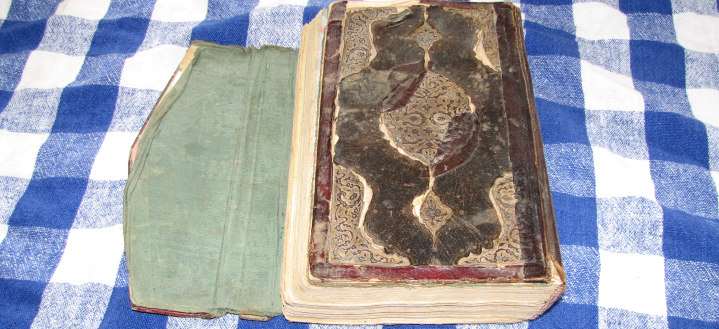Is there assurance of salvation from sins in Islam? And how certain can Muslims be of going to paradise? There are very contradictory statements on this topic. On the one hand, Allah is promising paradise to His believers (9,72) and that he will keep this promise (3,9), on the other hand nobody can feel secure of Allah’s ruse (7,99).
Good deeds
According to Qu’ran, all Muslims first go to hell after their death: „And there is none of you who shall not come down to her“ (sura 19,71-72; cf. 32,13; 7,179). Despite this, some Muslims do believe, that they will go to paradise, if they turn from their evil deeds. Jews and Christians will be condemned to hell instead of them (in their place) (Hadith Muslim 6665-6668). It[Dieter1] [Unbekannt2] depends on the good and evil deeds of a Muslim who is not willing to repent if and after what time he is going to be accepted in paradise after some kind of purgatory (Hadith Al Buchari 9:542). The good deeds will be put on a balance: “Those whose scalepans[Dieter3] are heavy, that are the successful ones. Those whose scalepans are light have lost themselves and will end in hell, where they will stay eternally.” (sura 23,102-103; cf. 21,47).
Good works in Islam are: that Muslims believe in Allah and his prophets, that they stick to the 5 pillars of Islam (confession, ritual prayer, alms {giving to the poor}, fasting, pilgrimage) and that they honour Mohammed above all else (Al Buchari 1:13). According to this one will go to paradise if he collects enough good works: “Truly, those who believe and do good works are the best creatures. Through their Lord their wages are the gardens of Eden” (sura 98,7-8; cf. 14,23; 5,9; 42,26). Yes, good deeds can even pay off the bad ones: “The good deeds redeem the evil ones” (11,114; cf. 25,70). Though the expectation to go to paradise must remain uncertain, because no Muslim has got insight into his “paradise account” and so he never can know if his works will be sufficient. Furthermore it says in one Hadith, in contradiction to the cited verse of Qu’ran, that good deeds will not provide access to paradise to anyone (Al Buchari 8:474).
Vague hopes
As Muslims are uncertain if they go to paradise by accomplishing good works, they look for other possibilities of making sure that they go to paradise. Thus Mohammed is said to be an advocate on judgement day, for Mohammed was allowed to intercede for his followers when he lived on earth (47,19; 2,555; Al-Buchari 2:553). Whoever dies in jihad for Allah, secures his access to paradise: “Allah has bought from the believers their lives and belongings for paradise: They fight for Allah’s cause, they kill and are killed; a promise – binding for Him – in the Torah, the Gospel and the Qu’ran. And who keeps his promise more faithfully than Allah?” (9,111; s.a. 3,157-158; 4,74; 2,245; Al-Buchari 1:35; 4:46; 4:175; 4:386; 9:555). By making these statements Mohammed encourages his followers with the reward of paradise, to go to war against Non-Muslims, to force Islam upon them or to kill them. Up to today[Dieter4] [Unbekannt5] terrorist attacks claimed by Islamists are justified through these verses, giving it all the aim to go to paradise. Still, even this does not bring total certainty[Dieter6] . Since firstly, the motives of the Muslim concerned have to be true, secondly, it has really to be about “the cause of Allah” (which is often subject to controversy) and thirdly, Allah’s absolute freedom of decision is not to be questioned. By extension the reciting of various suras of Qu’ran ought to enable a Muslim to enter paradise. For example sura 16; 21; 22. This applies also to whosoever knows the 99 names of God (Al Buchari 3:894; 8:419); whoever does good for his relatives; whosoever restrains himself and controls his mouth; whosoever loses two or three of his children before they reach the age of puberty (Al Buchari 2:340); whosoever raises three daughters or sisters well and is good to them; whosoever defends a Muslim (against accusations) while he is absent; whosoever attends (from the start) the ritual prayer in a mosque on 40 consecutive days; whosoever has good manners and is lenient; the woman who lives in a chaste manner and is obedient to her husband; whosoever is not arrogant; whosoever does not leave debts and does not steel from the [Unbekannt7] prize money; a man who treats his family and Muslims in a friendly way; who does not ask anyone for help; whosoever removes harmful things from the Muslims´ path; whosoever gives time to his debtor to pay back and partly pays back somebody’s debt; whosoever asks Allah thrice, not to go to hell but to go to paradise (www.islamhouse.com; Dec.2012).
Forgiveness is granted to whosoever ritually prays in the fasting month Ramadan during the whole night of the night of the revelation of Qu’ran (also “Night of Power”) (Al Buchari 3:231). Whosoever makes a pilgrimage in the setting of the yearly Hadsch to Mecca, ought to be clean like a newborn (Al-Buchari 3:46). If a Muslim dies believing in Allah and does not revere another God besides him, he goes to paradise (Al Buchari 7:717). Therefore Muslims should repent and recite the islamic confession of faith while dying.
Predestination
For Muslims, too, the certainty to be accepted by God is linked to forgiveness of their sins. Although Allah should be “merciful and full of forgiveness” (34,2) and forgives all sins (39,53), there remains a strong uncertainty. As God maybe can forgive or simply not forgive (39,53), God can do what he pleases (2,284). It is not foreseeable how He will decide in any individual case. Muslims believe less in good works they rather believe in God’s predestination for paradise or hell: “We have created quite a lot Dschinns (demons) and humans for the hell” (7,179). The predestination for paradise and hell is also confirmed in the Hadiths: An angel breathes the breath of live into a human being and determines his destiny. A person can be evil and changes his behaviour at the last moment and goes to paradise, another one lives a good life until the end and then becomes evil which makes him go to hell. Both is predestined (Al-Buchari 4:430). That is why the future destiny of a Muslim lies, according to … islamic understanding, “between fear and hope”: “call upon Him in [times of] fear as in [times of] hope” (7,56; s.a. 32,16; 39,9).
The uncertainty of Mohammed
Even Mohammed did not know for certain if he himself or his followers would go to paradise: “I do not know what will happen with me nor do I know what will happen to you” (sura 46,9; cf. Al-Buchari 5:266 and 4:16). Even Mohammed’s most important followers and later Califs (of later on), Abu Bakr and Omar, were uncertain if they would go to paradise, although Mohammed promised later on, ten of his followers, including them, that they would go to paradise (Muslim 0220).
Paradise for Non-Muslims?
In the Qu’ran, Mohammed refuses the idea that Christians are children of God or beloved ones of God (5,18). Apparently, Christians and Jews invited Mohammed, out of a full conviction of their faith, to their faith[Dieter8] – an invitation that he declined (2,120). Some Muslims admit the idea of a paradise for Christians (2,62). Yet in Islam the most commonly shared view is that all Christians, Jews and Sabaeans, who lived before Mohammed, will go to paradise, but all Christians who lived after Mohammed must accept Islam in order to go to paradise: “whosoever desires another religion than Islam: never shall be taken from him[Dieter9] and in … he shall be amongst the losers” (3,85). Hell awaits atheists and polytheists (believers in many Gods) or Muslims, who fall from Islam. “… Their works are invalid and they will stay (eternally) in hellfire” (9,17).
Conclusion and Assessment
The certainty[Dieter10] to go to paradise is not a dogmatical question in the first place, but a certainty that can be experienced. It is given as a present by the Holy Spirit to everyone, who turns from his evil ways and accepts Jesus Christ as his redeemer and thus experiences communion with the Father and the Son. Muslims cannot talk about a certainty[Dieter11] of salvation, because that would make them challenge God’s own free will and His free decision-making (2,20; 16,93). For a Muslim the decision if he is saved or not, is only certain on the day of judgement. Unlike Muslims, Christians do have a constant clear promise of God, that they will not come into judgement (John 5,24; 1.John 5,12). The salvation for eternal life linked to Jesus Christ is absolutely certain, and Christians can and should even now be able to rejoice in their salvation (Luke 10,20; 1.John 5,13f). Therefore Christians have reason to and should courageously invite Muslims to the Christian faith. God’s salvation is for all men, including Muslims who accept Jesus as saviour. In doing so Christians should emphasize, though, in order to prevent the Muslim reproach of arrogance, that salvation is not depending on their own good works and on their sincerity, but on God’s firm promise.
You can quote or use this essay on the condition that you do not change the content and acknowledge the author: www.orientierung-m.de

